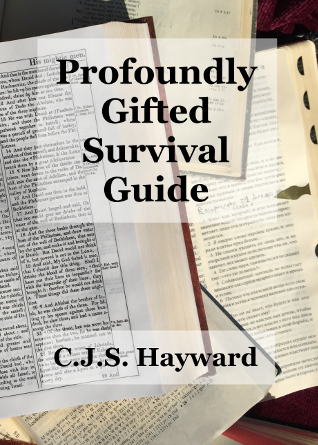As we [Paul and Silas] were going to the place of prayer, we were met by a slave girl who had a spirit of divination and brought her owners much gain by soothsaying. She followed Paul and us, crying, "These men are servants of the Most High God, who proclaim to you the way of salvation." And this she did for many days. But Paul was annoyed, and turned and said to the spirit, "I charge you in the name of Jesus Christ to come out of her." And it came out that very hour.
But when her owners saw that their hope of gain was gone, they seized Paul and Silas and dragged them into the market place before the rulers; and when they had brought them to the magistrates they said, "These men are Jews and they are disturbing our city. They advocate customs which it is not lawful for us Romans to accept or practice."
The crowd joined in attacking them; and the magistrates tore the garments off them and gave orders to beat them with rods. And when they had inflicted many blows upon them, they threw them into prison, charging the jailer to keep them safely. Having received this charge, he put them into the inner prison and fastened their feet in the stocks.
But about midnight Paul and Silas were praying and singing hymns to God, and the prisoners were listening to them, and suddenly there was a great earthquake, so that the foundations of the prison were shaken; and immediately all the doors were opened and every one's fetters were unfastened. When the jailer woke and saw that the prison doors were open, he drew his sword and was about to kill himself, supposing that the prisoners had escaped. But Paul cried with a loud voice, "Do not harm yourself, for we are all here."
And he called for lights and rushed in, and trembling with fear he fell down before Paul and Silas, and brought them out and said, "Men, what must I do to be saved?"
And they said, "Believe in the Lord Jesus, and you will be saved, you and your household." And they spoke the word of the Lord to him and to all that were in his house. And he took them the same hour of the night, and washed their wounds, and he was baptized at once, with all his family. Then he brought them up into his house, and set food before them; and he rejoiced with all his household that he had believed in God.
Acts 16:16-34, RSV
As he [Jesus] passed by, he saw a man blind from his birth. And his disciples asked him, "Rabbi, who sinned, this man or his parents, that he was born blind?"
Jesus answered, "It was not that this man sinned, or his parents, but that the works of God might be made manifest in him. We must work the works of him who sent me, while it is day; night comes, when no one can work. As long as I am in the world, I am the light of the world."
As he said this, he spat on the ground and made clay of the spittle and anointed the man's eyes with the clay, saying to him, "Go, wash in the pool of Silo'am" (which means Sent). So he went and washed and came back seeing.
The neighbors and those who had seen him before as a beggar, said, "Is not this the man who used to sit and beg?" Some said, "It is he"; others said, "No, but he is like him." He said, "I am the man."
They said to him, "Then how were your eyes opened?"
He answered, "The man called Jesus made clay and anointed my eyes and said to me, `Go to Silo'am and wash'; so I went and washed and received my sight."
They said to him, "Where is he?" He said, "I do not know."
They brought to the Pharisees the man who had formerly been blind. Now it was a sabbath day when Jesus made the clay and opened his eyes. The Pharisees again asked him how he had received his sight. And he said to them, "He put clay on my eyes, and I washed, and I see."
Some of the Pharisees said, "This man is not from God, for he does not keep the sabbath." But others said, "How can a man who is a sinner do such signs?" There was a division among them.
So they again said to the blind man, "What do you say about him, since he has opened your eyes?" He said, "He is a prophet."
The Jews did not believe that he had been blind and had received his sight, until they called the parents of the man who had received his sight, and asked them, "Is this your son, who you say was born blind? How then does he now see?"
His parents answered, "We know that this is our son, and that he was born blind; but how he now sees we do not know, nor do we know who opened his eyes. Ask him; he is of age, he will speak for himself." His parents said this because they feared the Jews, for the Jews had already agreed that if any one should confess him to be Christ, he was to be put out of the synagogue. Therefore his parents said, "He is of age, ask him."
So for the second time they called the man who had been blind, and said to him, "Give God the praise; we know that this man is a sinner."
He answered, "Whether he is a sinner, I do not know; one thing I know, that though I was blind, now I see."
They said to him, "What did he do to you? How did he open your eyes?"
He answered them, "I have told you already, and you would not listen. Why do you want to hear it again? Do you too want to become his disciples?"
And they reviled him, saying, "You are his disciple, but we are disciples of Moses. We know that God has spoken to Moses, but as for this man, we do not know where he comes from."
The man answered, "Why, this is a marvel! You do not know where he comes from, and yet he opened my eyes. We know that God does not listen to sinners, but if any one is a worshiper of God and does his will, God listens to him. Never since the world began has it been heard that any one opened the eyes of a man born blind. If this man were not from God, he could do nothing."
They answered him, "You were born in utter sin, and would you teach us?" And they cast him out.
Jesus heard that they had cast him out, and having found him he said, "Do you believe in the Son of man?"
He answered, "And who is he, sir, that I may believe in him?"
Jesus said to him, "You have seen him, and it is he who speaks to you."
He said, "Lord, I believe"; and he worshiped him.
John 9:1-38, RSV
The Gospel today deals with physical blindness, but it is about much more than physical blindness. In this passage, the man who was blind from birth received his physical sight. That is an impressive gift, but there's more. The passage deals with the Pharisees' spiritual blindness, but the Church has chosen to end today's reading with the blind man saying, "Lord, I believe," and worshipping Christ. When he did this, the blind man demonstrated that he had gained something far more valuable than physical sight. He had gained spiritual sight. The Bible actually gives a few more chilling words about the Pharisee's spiritual blindness, but the Church, following the Spirit, is attentive to spiritual sight and ends its reading with the man demonstrating his spiritual sight by adoring Christ in worship.
What is spiritual sight? We see a glimmer of it in the passage from Acts, where we read something astonishing. We read that Paul and Silas were stripped, savagely beaten, and thrown into what was probably a dungeon. And how do they respond to their "reward" for a mighty good deed? Do they say, "Why me?" Do they rail at God and tell him he's doing a lousy job at being God? Do they sink into despair?
In fact none of these happen; they pray and sing to God. Like the man born blind, they turn to God in worship. As should we.
That is advanced spiritual sight. I'm not there yet and you're probably not there either. But let me suggest some basic spiritual sight: Next time someone cuts you off on the road and you almost have an accident, instead of fuming and maybe thinking of evil things to do the other driver, why don't you thank God?
What do you have to be thankful for? Well, for starters, your eyes work and so do your driver's reflexes, you have a car, and your brakes work, and probably your horn. And God just saved you from a nasty scrape that would have caused you trouble. Can't you be thankful for some of that?
In the West, we think in terms of rights. Almost all of the ancient world worked without our concept of rights. People then, and some people now, believed in things we should or should not do—we should love others and we shouldn't steal, cheat, or murder—but then there was a queer shift to people thinking "I have an entitlement to this." "This is something the universe owes me." Now we tend to have a long list of things that we're entitled to (or we think God, or the universe, or someone "owes me"), and if someone violates our rights, boy do we get mad.
But in fact God owes none of the things we take for granted. Not even our lives. One woman with breast cancer responded to what the women's breast cancer support group was named ("Why me?"), and suggested there should be a Christian support group for women with breast cancer called "Why not me?"
That isn't just a woman with a strong spirit speaking. That is the voice of spiritual sight. Spiritual sight recognizes that we have no right to things we take for granted. We have no right to exist, and God could have created us as rocks or fish, and that would have been generous. We have no right to be free of disease. If most of us see, that is God's generosity at work. He doesn't owe it to us. Those of us who live in the first world, with the first world's luxuries, do not have those luxuries as any sort of right.
I am thinking of one friend out of many who have been a blessing. I stop by his house, and he receives me hospitably. Usually he gives me a good conversation and I can hold his bunny Smudge on my lap and tell Smudge that my shirt is not edible. This is God's generosity and my friend's. Not one of these blessings is anything God owes me, or for that matter my friend owes me. Each visit is a gift.
It isn't just first world luxuries that none of us are entitled to. We have no right to live in a world where a sapphire sky is hung with a million constellations of diamonds. If there is a breathtaking night sky, God chose to create it in his goodness and generosity. Not only do I have no right to be a man instead of a butterfly or a bird (or to exist in the first place), I have no right to be in community with other people with friendships and family. God could have chosen to make me the only human in a lonely world. Instead, in his sovereignty, he chose to place me in a world of other people where his love would often come through them. I have no right to that. I'm not entitled to it. If I have friends and family, that is because God has given me something better than I have any right to. God isn't concerned with giving me the paltry things I have a right to. He is generous, and gives all of us things that are better than our rights. We have no right to join the seraphim, cherubim, thrones, dominions, powers, authorities, principalities, archangels, and angels—rank upon rank of angels adoring God. Nor do we have any right to live in a world that is both spiritual and material, where God who gives us a house of worship to worship him in, also truly meets us as we work, garden, play, visit with our friends, and go about the business of being human.
Isn't it terrible if we don't have rights? It's not terrible at all. It means that instead of having a long list of things we take for granted as "Here's what God, or the universe, or somebody owes me," we are free not to take it for granted and to rejoice at God's generosity and recognize that everything we could take for granted, from our living bodies to the possessions God has given us to God placing us at a particular point in place in time and choosing a here and now for us, with our own cultures, friendships, languages, homelands, sights and sounds, so that we live as much in a particular here and now as Christ, to a world carpeted with life that includes three hundred and fifty thousand species of beetles, to the possibility of rights. Every single one of these is an opportunity to turn back in praise and worship God. It is an opportunity for joy, as we were created for worship and we find our fullest joy in worshipping God and thanking him. Would you rather live in a world where you only have some of the things that can be taken for granted, or in a world where God has created for you so many more blessings than he or anyone else owes you?
There is, actually, one thing that we have a right to, and it's a strange thing to have a right to. Hell. We have a right to go to Hell; we've earned a ticket to Hell with our sins, and we've earned it so completely that it cost God the death of his Son to let us choose anyone else. But Hell is not only a place that God casts people into; it is also where he leaves people, with infinite reluctance, after he has spent a lifetime telling people, "Let go of Hell. Let go of what you think you have a right to, and let me give you something better." Hell is the place God reluctantly leaves people when they tell him, "You can't take my rights away from me," and the gates of Hell are barred and bolted from the inside by people who will not open their hands to the Lord's grace. The Lord is gracious, and if we allow him, he will give us something infinitely better than our rights. He will give us Heaven itself, and God himself, and he will give us the real beginnings of Heaven in this life. The good news of God is not that he gives us what we think we have a right to, but that he will pour out blessings that we will know we have no right to, and one of these blessings is spiritual sight that recognizes this cornucopia as an opportunity for joyful thanksgiving and worship.
When I was preparing this homily, there's one word in the Greek text that stood out to me because I didn't recognize it. When the blind man says that Christ must be from God and have healed him as a "worshiper of God," the word translated "worshiper of God" istheosebes, and it's a very rare word in the Orthodox Church's Greek Bible. Another form of the word appears in Acts but this is the only time this word appears in either the Gospels or the books John wrote. It is also rare in the Greek Old Testament, the Septuagint. It occurs only four times: once in IV Maccabees 15:28 where the mother of seven martyred sons sees past even her maternal love "because of faith in God" (15:24) and is called "the daughter of God-fearing [theosebes] Abraham," and three times in Job where the blameless Job is called a theosebes, or "worshiper of God." In Job, this word occurs once in the book's opening verse, then Job is twice called a "worshiper of God" by God himself. The Maccabees' mother is not even called theosebes herself, but "the daughter oftheosebes Abraham."
What does this mean? I'm not sure what it all means, but John didn't use very many unusual words. Unlike several New Testament authors, he used simple language. In the Greek Old Testament, this word is reserved for special occasions, it seems to be a powerful word, and it always occurs in relation to innocent suffering. Job is the very image of innocent suffering and the Maccabees mother shows monumental resolve in the face of innocent suffering—the text is very clear about what it means for a mother to watch her sons be tortured to death. The Gospel passage is about innocent suffering as well as spiritual sight. When the blind man calls Christ a "worshiper of God," he is speaking about a man who would suffer torture for a miracle, before Paul and Silas, and this little story helps move the Gospel towards the passion. But Christ says that the blind man suffered innocently, and I'm not sure that we recognize all of what that meant.
People believed then, as many people believe now, that sickness is a punishment for sin. The question, "Who sinned? Who caused this man's blindness?" was an obvious question to ask. And Jesus says explicitly that neither this man nor his parents sinned to bring on his blindness. Jesus, in other words, says that this man's suffering was innocent, and he was saying something shocking.
What does this have to do with spiritual sight?
Spiritual sight is not blind to evil. The Son of God came to destroy the Devil's work, and that includes sin, disease, and death. Sin, disease, and death are the work of the Devil. The woman who survived breast cancer who suggested there should be a Christian support group called "Why not me?" never suggested that cancer is a good thing, and would probably never tell a friend, "I wish you could have the sufferings of cancer." When Paul and Silas were beaten with rods, being spiritual didn't mean that they didn't feel pain. I believe the beatings hurt terribly. Sin is not good. Disease is not good. Death is not good. Spiritual sight neither ignores these things, nor pretends that they are blessings from God. Instead, God transforms them and makes them part of something larger. He transformed the suffering of Paul and Silas into a sharing of the sufferings of Christ, a sharing of the sufferings of Christ that is not only in the Bible but is written in Heaven. I've had sufferings that gave terrifying reality to what had always seemed a trite exaggeration that "Hell is a place you wouldn't wish on your worst enemy." My sufferings are something I wouldn't wish on my worst enemy, and it is terrifying to realize that Hell is worse. So why then is spiritual sight joyful?
C.S. Lewis in The Great Divorce describes a journey. This journey begins in an odd place, and one that is not terribly cheerful. Anyone can have anything physical he wants just by wishing, only it's not very good. The ever-expanding borders of this place are pushed out further and further as people flee from each other and try to get what they want.
A bus Driver takes anyone who wants into his bus, which ascends and ascends into a country that is painfully beautiful to look at, where not only are the colors bright and full but heavy, rich, and deep. It is painful to walk on the ground because the people who got off the bus are barely more than ghosts, devoid of weight and substance, and their feet are not real enough to bend the grass. This is in fact a trip from Hell to Heaven, where Hell is mediocre and insubstantial, and Heaven is real and hefty beyond measure, not only beautiful and good but colorful and rich and deep—and infinitely more real than Hell. One part that really struck me was that when Lewis's Heavenly guide (George MacDonald) explains why a woman in Heaven, whom MacDonald said had gone down as far as she could, did not go so far as descending to Hell:
"Look," he [MacDonald] said, and with the word he went down on his hands and knees. I did the same (how it hurt my knees!) and presently saw that he had plucked a blade of grass. Using its thin end as a pointer, he made me see, after I had looked very closely, a crack in the soil so small that I could not have identified it without his aid.
"I cannot be certain," he said, "that this is the crack ye came up through. But through a crack no bigger than that ye certainly came."
"But—but" I gasped with a feeling of bewilderment not unlike terror. "I saw an infinite abyss. And cliffs towering up and up. And then this country on top of the cliffs."
"Aye. But the voyage was not mere locomotion. That buss, and all you inside it, were increasing in size."
"Do you mean then that Hell—all that infinite empty town—is down some little crack like this?"
"Yes. All Hell is smaller than one pebble of your earthly world: but it is smaller than one atom of this world, the Real World. Look at yon butterfly. If it swallowed all Hell, Hell would not be big enough to do it any harm or have any taste."
"It seems big enough when you're in it, Sir."
"And yet all loneliness, angers, hatreds, envies and itchings that it contains, if rolled into one single experience and put into the scale against the least moment of the joy that is felt by the least in Heaven, would have no weight that could be registered at all. Bad cannot succeed even in being bad as truly as good is good."
Bad cannot succeed even in being bad as truly as good as good is good, and spiritual sight knows this. To have spiritual sight is not to close your eyes so tight they don't even see evil, but to let God open your eyes wider. Our eyes can never open wide enough to see God as he truly is, but God can open our eyes wide enough to see a lot. Why were Paul and Silas able to turn from being viciously beaten and imprisoned to singing and praying to God? For the same reason a butterfly from Heaven could swallow all of Hell without it even registering. In that image of Heaven, not just the saints but the very birds and butterflies could swallow up Hell. This is just an image; the Real Place, real Heaven, is far more glorious.
Death is swallowed up in victory. Let us let spiritual blindness be swallowed up by spiritual sight that begins to see just how much God's generosity, grace, mercy, kindness, love, and 1001 other gifts we have to be thankful for. Let us worship God.





